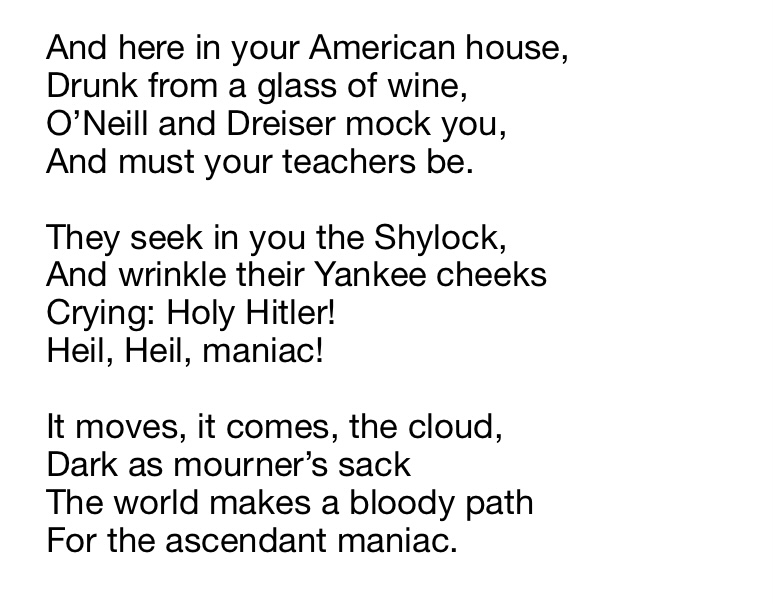
Bluma. Fan of golems and werewolves. @bluma.bsky.social https://t.co/kTAelTLMLA
How to get URL link on X (Twitter) App


 There is likely a bit of a physical union, shades of the existence of the shechinah, or dwelling of God between a man and wife — but also perhaps a fraternal spiritual/intellectual union of minds.
There is likely a bit of a physical union, shades of the existence of the shechinah, or dwelling of God between a man and wife — but also perhaps a fraternal spiritual/intellectual union of minds.



 And here I move laterally to the poem ‘Tired’ by a contemporary of Leivick’s, Langston Hughes.
And here I move laterally to the poem ‘Tired’ by a contemporary of Leivick’s, Langston Hughes. 

 Another wrestling with the natural and the divine, where do we come from, where do we go, why and how. Can we only be what we are destined to be? If God is in everything, then where is God in the sanatorium, in death? We foreshadow the pantheism of ‘Spinoza’
Another wrestling with the natural and the divine, where do we come from, where do we go, why and how. Can we only be what we are destined to be? If God is in everything, then where is God in the sanatorium, in death? We foreshadow the pantheism of ‘Spinoza’



 If we jump ahead again to ‘Leaf on an Apple Tree’, Leivick writes from Munich in 1946 (a rarity in that the poem is explicitly dated, from a time when he said he was largely unable to write poetry) having visited Dachau, about the ‘Cain-brotherhood’ of Germany.
If we jump ahead again to ‘Leaf on an Apple Tree’, Leivick writes from Munich in 1946 (a rarity in that the poem is explicitly dated, from a time when he said he was largely unable to write poetry) having visited Dachau, about the ‘Cain-brotherhood’ of Germany. 


 The May Day poems also continue beyond that point, through ‘In Treblinka bin ikh nit geven’ and there is even in that volume a temporary mending of fences, it seems, with the Soviets when they are anti-Nazi.
The May Day poems also continue beyond that point, through ‘In Treblinka bin ikh nit geven’ and there is even in that volume a temporary mending of fences, it seems, with the Soviets when they are anti-Nazi.

 He seemed to like to take the opportunity to leave — in his prose pieces, he’s quite often slipping out the door and going for a wander. Perhaps it’s more about the fact that he *can* leave and exercises the option in order not to lose it.
He seemed to like to take the opportunity to leave — in his prose pieces, he’s quite often slipping out the door and going for a wander. Perhaps it’s more about the fact that he *can* leave and exercises the option in order not to lose it.


 I would argue, in light of Horn, that if you work with the idea that in the two Golem plays Leivick acknowledges a belief in the concept of two Moshiachs, Ben Yosef and Ben David — then as a revolutionary…
I would argue, in light of Horn, that if you work with the idea that in the two Golem plays Leivick acknowledges a belief in the concept of two Moshiachs, Ben Yosef and Ben David — then as a revolutionary…

 In his post-Khurbn writing he often portrays himself (and also American Jewry) as the father and the son, the knife and the throat — the (potential) victim and the culpable-through-insufficient action.
In his post-Khurbn writing he often portrays himself (and also American Jewry) as the father and the son, the knife and the throat — the (potential) victim and the culpable-through-insufficient action.

 I have written it longer form elsewhere, as part of a look at the disservice these ‘fables,’ which include real murdered Jews as set dressing for the imagined tragedy of ‘normal people’, do and how they undermine what is perhaps the most Jewish mode of memorialisation — the book.
I have written it longer form elsewhere, as part of a look at the disservice these ‘fables,’ which include real murdered Jews as set dressing for the imagined tragedy of ‘normal people’, do and how they undermine what is perhaps the most Jewish mode of memorialisation — the book.